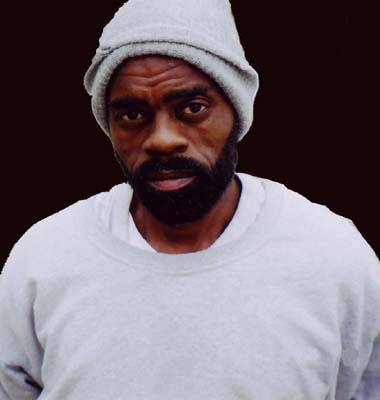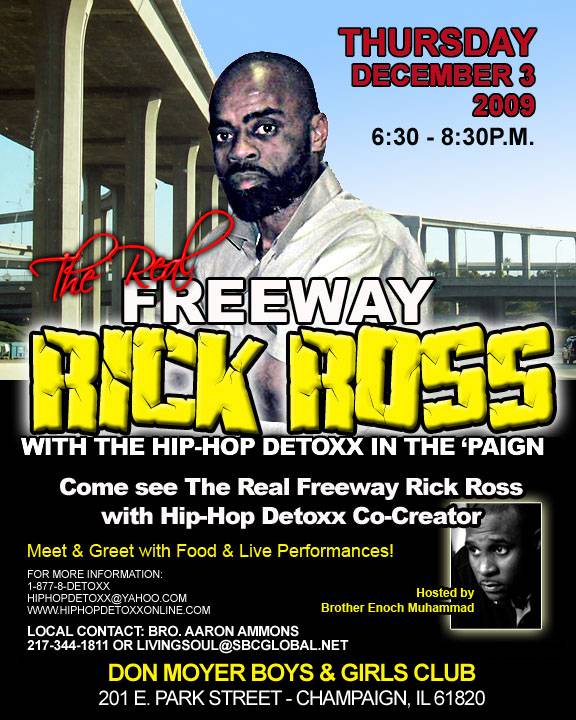
Rick Ross has had quite a life, and he’s coming to Champaign on Thursday to share some of his experiences with local young people.
In a free event in conjunction with Chicago-based Hip Hop Detoxx, Ross will be appearing at the Don Moyer Boys and Girls Club (201 E. Park St., Champaign) from 6:30 to 8:30 p.m. on Thursday. C-U Citizens for Peace and Justice organized the event “in the wake of the police shooting of Kiwane Carrington and part of our ongoing efforts to work with local youth to improve police/community relations,” according to CUCPJ’s Brian Dolinar.
In the 1980s, “Freeway” Ricky Ross operated an national drug trafficking ring from his home in south-central Los Angeles. His Nicaraguan supplier was also a CIA operative and a figure in Iran-Contra. Ross was convicted of cocaine trafficking in 1996, and was just released from federal prison in September. I spoke with Ross and Hip Hop Detoxx co-founder Enoch Muhammad by phone earlier this week.
Smile Politely: When did you get out of prison?
Rick Ross: I’ve been out two months and a couple weeks, maybe.
Smile Politely: How is that going?
Rick Ross: Life has been wonderful, having been equipped to deal with almost any situation has been wonderful. I did 13 years and 7 months straight. 14 years, I forget sometimes. I got in, like, 20 years and 4 months, total.
Smile Politely: Can you tell us a little bit how you two got connected?
Enoch Muhammad: I read a lot of different types of newspapers and periodicals, and I saw this interview with Brother Rick in The Final Call newspaper. So, when I saw and read the article, it not only inspired me, but it made me to know, whether I’d ever met this brother or not, or knew his first name or his last name, what he had dealt with in his life, I could relate to that, and considering where he’s heading in his life, as a road to redemption, he’s doing atonement in his work, that he’s embarking on now. When I saw that, I thought I really would like to have this brother come and be part of what we’re doing. That’s pretty much in a nutshell what inspired me, just reading his words – I’d known about him for years – from the perspective of what the media said about him, and the things I learned while I was in school about the CIA and the government’s use of him and what he had to go through. I thought it was a blessing to be able to talk to him, and do some good work with these youth who are a product of the ’80s and ’90s.
Smile Politely: Do you have anything you’d like to add to that, Rick?
Rick Ross: I’m glad that the stuff that I’ve been doing has been able to grab people’s attention, you know like Brother Enoch, I know he’s a conscious brother and we can start attracting some of these guys who are less equipped or educated, should I say, those who really need the help. When Brother Enoch talked to me, I was overwhelmed to know that there’s others out there that are trying to do the same work. I mean, there are people out here that are trying to do the work, but it’s so few and in between, when I hit these high schools and junior highs up, you know? The kids tell me stuff like, nobody cares, nobody has taught them how to do critical thinking, how to analyze a situation, and those are the things that we really need, moreso than anything, to teach these people how to analyze a situation, how to deal with a crisis, and they don’t know how to deal with it.
Smile Politely: How do you connect with these kids in a way that maybe isn’t working in a classroom setting?
Rick Ross: In my experience, in these schools, to be honest, the teachers are not even critical thinkers. I’ve seen how they deal with the kids, and they’re telling me things like, ‘Nobody likes that class.’ And I’m like, how can you not like an 11, 12, or 14-year-old kid? What has he done that you don’t like him, or you don’t like being around him? Yeah, they may be noisy, they may not pay attention right off the bat, but it’s your job to learn how to get their attention. What I’ve been studying is basically how to get these kids’ attention. To get anybody’s attention, the first thing that you have to do is understand them. Too often, the people that I see, they want the kids to understand them, but first you’ve got to understand, and then you can be understood. The first thing that I try to do is get their trust and let them know that I really want to hear what they have to say, and that they is important to me. Once you get their attention, you can start solving the problem. You can’t just start pushing your agenda on someone else.

Smile Politely: What’s the event in Champaign going to be like?
Enoch Muhammad: When we come to Champaign it’s going to be a lot of question and answer time for people to be able to talk to Rick directly about his life, where he’s going, where he’s headed, because a lot of the youth may have seen BET’s American Gangster (watch the episode featuring Ross here), and some of the parents are also familiar with the whole story across the country. We’re going to have some live performances and some information put out there to help facilitate critical thinking, because that’s a serious part about not only what we’re learning ourselves, but also to ask questions and seek information and be willing to understand the times we’re living in.
Rick Ross: And remember, when you’re a critical thinker, it doesn’t matter what field you go into. When you’re a critical thinker, you can solve problems. Critical thinkers are the ones that send spaceships into space, they’re the ones that build houses, and they’re the ones that do everything that happens on this earth. You have to be a critical thinker, you have to sit down and figure out what you’re trying to accomplish. I think our kids haven’t sat down and figure out what they’re trying to accomplish. They’re just out here basically following their leaders.
Check out my website, Freewayenterprise.com. I’m credited as being the first prisoner to form a social network. Also, to give you a little background on myself, I was 28 years old when I started to read and write, so I’m considered the ultimate underdog, I started from totally behind. Well, not really make up for lost time, because I didn’t really lose that time, that time was spent. Whether I spent it wisely or unwisely is a question, but I think I spent it wisely because I spent it reading and studying and bettering myself. I learned things like you never stop learning, no matter what position you’re in. The minute you stop learning, you start to go backwards. The minute you stop growing, you start to die. Knowing those things now, I’m constantly seeking perfection. Every minute after I wake up, I’m chasing perfection, and we have to translate that type of thing to our kids.
Smile Politely: Did the CIA come to interview you while you were in prison?
Rick Ross: Yeah, they sent their investigators down to interview me. I spoke to them, I spoke to the Attorney General, I had congress members come down to me, it was enormous.
Smile Politely: Were you aware that the CIA was involved when you were selling drugs?
Rick Ross: No, when I was selling drugs, I didn’t know that they were involved. I found out at trial, when my supplier testified that he was a CIA operative. Basically, we know without question that the CIA knew that he was selling drugs. They deny that they sanctioned it, they deny it, but to know that they were selling drugs to me was enough to show involvement. Your job is to stop crime from happening in America, but if you turn a blind eye to crime, and something that is your job to stop, then that’s evidence enough for me. I don’t know what everyone else needs, but I’m totally satisfied that they were involved.
——
Relevant Links
The Real Freeway Ricky Ross Blog
San Jose Mercury News’ coverage of CIA-cocaine link








